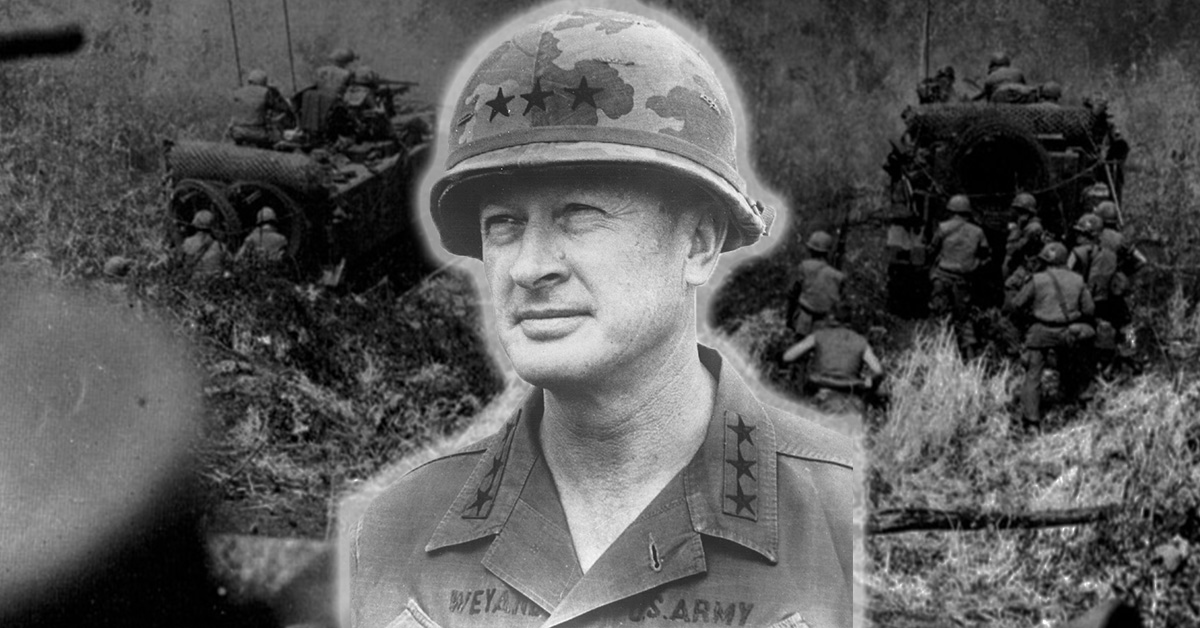
General Frederick C. Weyand served as the 28th Chief of Staff of the Army in the 1970s but, as Dr. Frank Jones of the U.S. Army War College explains, he earned the right to be considered a Great Captain from his efforts during the Vietnam War. Leveraging his intelligence background to survey the environment and the state of the South Vietnamese government and people, Weyand saw that the dominant U.S. military strategy of conventional war was not going to succeed. Instead, the war was headed toward stalemate and it was better to concentrate on winning over the peoples in the rural areas. This led to open disagreements with U.S. military leaders.
Weyand proved himself right when he moved his troops closer to Saigon than along the Cambodian border region, he succeeded in saving Saigon from the Tet Offensive and delivering a powerful blow to the North Vietnamese forces. Still, this success was obscured by strong anti-war sentiment back in the U.S., showing Weyand how the military was but one part of nation’s war effort. A BETTER PEACE Editor-in-Chief Jacqueline E. Whitt moderates.
He realized that in a democracy, military success is not sufficient
Podcast: Download
Subscribe: Apple Podcasts | Spotify | Amazon Music | Android | Pandora | iHeartRadio | Blubrry | Podchaser | Podcast Index | TuneIn | Deezer | Youtube Music | RSS | Subscribe to A Better Peace: The War Room Podcast
Frank Jones is Professor of Strategic Studies at the U.S. Army War College.
Jacqueline E. Whitt is Professor of Strategy at the U.S. Army War College and WAR ROOM’s podcast editor.
Photos: U.S. Army mechanized infantry soldiers in action during Operation Attleboro; portrait of LTG Weyand from Vietnam in front
Photo Credit: U.S. Army photos; image composed by Tom Galvin
Other releases in the “Great Captains” series:
- KNOWING WHEN A WAR IS UNWINNABLE — GENERAL FREDERICK C. WEYAND
(GREAT CAPTAINS) - AN UNBEATEN ROMAN GENERAL: SCIPIO AFRICANUS (GREAT CAPTAINS)
- KNOW THY ENEMY: OSAMA BIN LADEN & RISE OF THE NON-STATE ACTOR (GREAT CAPTAINS)
- GEORGE C. MARSHALL & LEADING THE NATIONAL WAR EFFORT (GREAT CAPTAINS)
- THE PARTNERSHIP OF ROBERT E. LEE AND STONEWALL JACKSON (GREAT CAPTAINS)
- HANNIBAL AND THE MARCH THROUGH THE ALPS (GREAT CAPTAINS)
- WILLIAM T. SHERMAN: THE FIRST ‘MODERN’ GENERAL (GREAT CAPTAINS)
- GEORGE WASHINGTON: THE LESSONS OF FAILURE (GREAT CAPTAINS)
- GREAT CAPTAINS: COMMAND & THOSE WHO DID IT BEST





Coincidently, this article was just published last Sunday – the Easter Offensive wasn’t a total surprise.
https://smallwarsjournal.com/jrnl/art/blame-intel
Pacification by 1971 was pegged at around 90%.
Abrams changed Westmoreland’s strategy to search and hold.
“Failed War?
Most Vietnam veterans believe that there were many reasons, not just one, why the Vietnam War ended so miserably. Here are some of the reasons, in no particular order. All quotes are from former NVA Colonel Bui Tin* who served on their general staff and received the unconditional surrender of South Vietnam on April 30, 1975.
We didn’t blockade Haiphong at the onset (where even British vessels could be found);
We didn’t knock out the railroad lines between China and North Vietnam;
U.S. ground forces were not allowed to interdict the Ho Chi Minh Trail. If they had, “Hanoi could never have won the war;”
Though North Vietnam clearly violated Cambodian and Laotian sovereignty, U.S. forces were not allowed to continue chasing (hot pursuit) the NVA/VC when they retreated back across these same borders;
The anti-war movement “was essential to our strategy.” The senior leadership followed the anti-war movement in the U.S. and “were elated” when Jane Fonda, Ramsey Clark and others visited. “America lost because of its democracy; through dissent and protest it lost the ability to mobilize a will to win;”
South Vietnam’s generals were “inept” and political;
The bombing of North Vietnam, if it had been concentrated (as in the Christmas bombing), “would have hurt our efforts.” Piecemeal bombing gave the North time to reshuffle and rebuild;
The NLF (National Liberation Front) was controlled by Hanoi – it was never independent (it was always run by a communist party commissar), despite efforts to convince the American public and politicians otherwise;
Regional and Popular Forces (Ruff/Puff) were in control of 90% of the populace countryside by 1972. The often-forgotten Peoples Self-Defense Force (PSDF) were there in the rural hamlets, too;
Fighting in 1968 had decimated communist forces in the South. Years of rebuilding compelled them to use NVA troops to fill out the VC ranks. “If American forces had not begun to withdraw under Nixon in 1969, they could have punished us severely;”
When President Ford failed to respond to the attack of Phuoc Long in January 1975, the North knew that their overall victory was at-hand;
“We had the impression that American commanders had their hands tied by political factors. Your generals could never deploy a maximum force for greatest military effort;”
The North only had to win over the American media in order to eventually be victorious because they swayed politicians (who love to be loved and, of course, reelected) and the feeble-minded university professors who love to pontificate and sell their books). Because fewer people read books today, let’s not forget the pseudo-documentarians and Hollywood-types who insist on stating or insinuating how bad the military was in Vietnam and how the communists forces were the good guys or merely misunderstood.
A few points: Search and Destroy became Clear and Hold under Abrams; by the end of 1971, 96.8% (A/B/C) of the villages/hamlets were pacified; 91% of Vietnam Veterans say they are glad they served and
74% say they would serve again, even knowing the outcome; the massive infusion of supplies by the Soviets (and, to a lesser degree, the Chinese) prior to the Easter Offensive wasn’t mentioned; and this same offensive was not a surprise to everyone (https://smallwarsjournal.com/jrnl/art/blame-intel).
I suggest that you address the criticisms of the education of officers and problems with thinking styles and knowledge when devising grand strategy. I would ask that a future podcast incorporate these ideas.
Military Anthropology: Soldiers, Scholars and Subjects at the Margins of Empire by Montgomery McFate
In almost every military intervention in its history, the US has made cultural mistakes that hindered attainment of its policy goals. From the strategic bombing of Vietnam to the accidental burning of the Koran in Afghanistan, it has blundered around with little consideration of local cultural beliefs and for the long-term effects on the host nation’s society. Cultural anthropology–the so-called “handmaiden of colonialism”–has historically served as an intellectual bridge between Western powers and local nationals. What light can it shed on the intersection of the US military and foreign societies today?
This book tells the story of anthropologists who worked directly for the military, such as Ursula Graham Bower, the only woman to hold a British combat command during WWII. Each faced challenges including the negative outcomes of exporting Western political models and errors of perception.
Ranging from the British colonial era in Africa to the recent wars in Iraq and Afghanistan, Military Anthropology illustrates the conceptual, cultural and practical barriers encountered by military organisations operating in societies vastly different from their own.
https://global.oup.com/academic/product/military-anthropology-9780190680176?cc=us&lang=en&#
As II Field Force commander, Weyand had the 303rd ASA Battalion and the 219th MI Detachment as part of his headquarters, which undoubtedly provided the intelligence on the NVA/VC units and intentions during Tet 68.
During the Easter Offensive of 1972, Weyand was in-charge because Abrams (Bunker, the J-2, et al) are out of the country. The offensive was not a surprise to everyone – the 571st MI Detachment reported it was going to happen and was virtually the only intelligence organization operating in I Corps for the first couple of weeks of the offensive.
“… not exactly one the proudest, sort of most shiniest moments…”? “Now (Vietnam veterans are receiving) the increased public recognition, bravery and compassion the overwhelming majority of these men and women displayed while they were serving in Vietnam.” (Weyand, 1998)
In the article, I do not agree with the comment regarding Weyand’s recommendation to keep troops close to Saigon was the failure of search and destroy. I do not think they are directly related. The US has turned over the defense of Saigon region more to the ARVN in 1967 as part of what became Vietnamization. Weyand should be credited with believing the VC planned attacks in urban areas like Saigon around Tet (before or after) so pulled by troops from the border area while Westmoreland was more fixated on I Corp (Khe Sanh).
Under Abrams, clear and hold was not a policy in the border areas such as the battle of Hamburger Hill. The pacification program was a mess until PROVN and moving all under MACV with Komer reporting to Westmoreland. The decimation of the Viet Cong at Tet and the PHEONIX program really helped pacification take hold. The ARVN were not capable of doing much until in 1967 when the situation improved (training, political stability). But Vietnamization was clearly going to fail when it became clear the ARVN could not survive without air support (72 Easter offensive) and the US refused to give them the aircraft to defend themselves and then later not providing air support in 1975. There were complaints the US was training the ARVN for the wrong type of war but in the end SVN fell by a conventional direct invasion and not guerilla activity